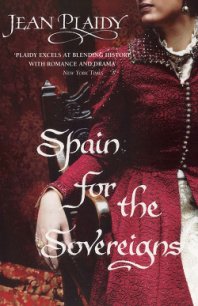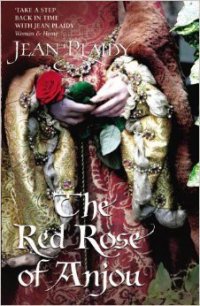Daughters of Spain - Plaidy Jean (читаем книги онлайн бесплатно полностью без сокращений txt) 📗
Toledo cared nothing that Juana was a woman. She was the rightful successor to Isabella and they would accept her as their Queen when the time came.
The Queen’s nervousness increased as the hour of the meeting with her daughter drew near.
I shall know, she told herself, as soon as I look at her. If there has been any change, it will immediately be visible to me. Oh, Juana, my dear daughter, be calm, my love. I pray you be calm.
Then she reminded herself that soon she would have Catalina home. What purpose could be served by her staying in England as the widow of the dead Prince? She must come home to her mother, so that she might more quickly recover from the shock her husband’s death must have caused her.
It was a beautiful May day when Philip and Juana rode into Toledo. At the doors of the great Alcazar Ferdinand and Isabella stood waiting to receive them.
Isabella’s eyes immediately went to her daughter. At first glance there appeared to be only that change which would seem inevitable after the ordeals of childbearing. Juana had given birth to a daughter, yet another Isabella, before she left Flanders. She had aged a little; and she had never been the most beautiful of their children.
And this was her husband. Isabella felt a tremor of fear as she looked at this fair young man who came forward with such arrogance. He was indeed handsome and fully aware of it. My poor Juana, thought Isabella. I hope it is not true that you love this man as distractedly as rumour tells me you do.
They were kneeling before the Sovereigns, but the Queen took her daughter and drew her into her arms. This was one of the rare occasions when Isabella disregarded etiquette. Love and anxiety were everything. She must hold this daughter in her arms, this one who had caused her more anxiety than any of the others, for she had discovered that she did not love her the less because of this.
Juana smiled and clung to her mother for a few seconds.
She is glad to be home! thought the Queen.
The brief ceremony was over, and Isabella said: ‘I am going to have my daughter to myself for a little while. Give me this pleasure. Philip, your father-in-law will wish to talk with you.’
Isabella took her daughter to that chamber in which, just over twenty years ago, she had been born.
‘Juana,’ Isabella held her daughter against her, ‘I cannot tell you how glad I am to see you. We have had so much sorrow since you left us.’
Juana was silent.
‘My dearest,’ went on the Queen, ‘you are happy, are you not? You are the happiest of my daughters. Your marriage has been fruitful, and you love your husband.’
Juana nodded.
‘You are too overcome with happiness at being home to speak of it. That is so, is it not, my love? My happiness equals yours. How I have thought of you since you went away. Your husband … he is kind to you?’
Juana’s face darkened, and the expression there set the Queen’s heart leaping in terror.
‘There are women … always women. There were women in Flanders. There have been women on the way. There will be women in Spain. I hate them all.’
‘While he is in Spain,’ said Isabella sternly, ‘there must be no scandal.’
Juana laughed that wild laughter which was reminiscent of her grandmother.
‘You would not be able to keep them away. They pursue him everywhere. Are you surprised? Is there a more handsome man in the world than my Philip?’
‘He has good looks, but he should remember his dignity.’
‘They won’t let him. It is no fault of his. They are always there.’ Juana clenched her hands together. ‘Oh, how I hate women!’
‘My dear, your father shall speak to him.’
Juana let out another peal of loud laughter. ‘He would not listen.’ She snapped her fingers. ‘He cares not that for anyone … not for my father, nor the King of France. Oh, you should have seen him in France. The women of Blois, and indeed all the towns and villages through which we passed … they could not resist him … they followed him, imploring him to take them to his bed …’
‘And he did not resist?’
Juana turned angrily on her mother. ‘He is but human. He has the virility of ten ordinary men. It is no fault of his. It is the women … the cursed women.’
‘Juana, my dear, you must be calm. You must not think too much of these matters. Men, who perforce must leave their wives now and then, often find consolation with others. That is but nature.’
‘It is not only when he has to leave me,’ said Juana slowly.
‘There, my dear, you must not take these matters to heart. He has done his duty by you. There are children.’
‘Do you think I care for that? Duty! Do I want duty as a bedfellow? I want only Philip, I tell you. Philip … Philip … Philip …’
Isabella looked furtively about her. She was terrified that Juana’s wild shouts might be heard. She must prevent rumour spreading through the Alcazar.
One thing was certain: marriage had done nothing to calm Juana.
They must prepare now to take the oath as heirs to Castile. This ceremony would take place in the great Gothic Cathedral, and Isabella was afraid that Juana’s wildness would show itself during the ceremony.
She sent for her son-in-law and she thought that, as he entered her apartment, his manner was insolent, but she quickly reminded herself that Flemish ways were not those of Spain; and she remembered how at times she had been faintly shocked by the manners of his sister, Margaret, who had been a good creature.
She dismissed all her attendants so that she might be quite alone with her son-in-law.
‘Philip,’ she said, ‘I have heard rumours which disturb me.’
Philip raised his insolent and well-arched eyebrows. How handsome he is! she thought. Isabella had never seen a man so perfectly proportioned, of such clear skin, such arrogance, such an air of masculinity, such suggestion of power and knowledge that he could do everything better than anyone else.
If Juana had gone to Portugal, to gentle Emanuel, how much better that would have been.
‘My daughter is devoted to you, but I understand you are less so to her. There have been unfortunate affaires.’
‘I can assure Your Highness that they have been far from unfortunate.’
‘Philip, I must ask you not to be flippant on a matter which to me is so serious. My daughter is … is not of a serene nature.’
‘Ha!’ laughed Philip. ‘That is one way of describing it.’
‘How would you describe it?’ asked Isabella fearfully.
‘Unbalanced, Madam, dangerous, tottering on the edge of madness.’
‘Oh, no, no … that is not so. You are cruel.’
‘If you wish me to make pretty speeches, I will do so. I thought you asked me for the truth.’
‘So … that is how you have found her?’
‘That is so.’
‘She is so affectionate towards you.’
‘Too affectionate by far.’
‘Can you say that of your wife?’
‘Her affection borders on madness, Madam.’
Isabella longed to dismiss this young man; she found herself loathing him. She was longing to go back in time and, if she could do that, she would never have allowed this marriage to take place.
‘If you treated her with gentle kindness,’ she began, ‘as I always tried to do …’
‘I am not her mother. I am her husband. She asks for more than gentle kindness from me.’
‘More than you are prepared to give?’
He smiled at her sardonically. ‘I have given her children. What more can you ask than that?’
It was no use pleading with him. He would continue with his amours. Juana was nothing to him but the heiress of Spain. If only he were nothing to her but Maximilian’s heir it would be better for her. To her he was the very meaning of her existence.




